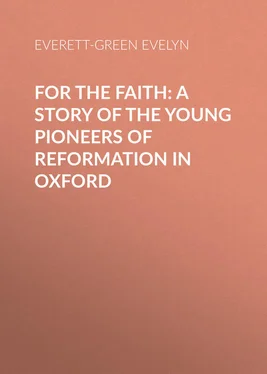Evelyn Everett-Green - For the Faith - A Story of the Young Pioneers of Reformation in Oxford
Здесь есть возможность читать онлайн «Evelyn Everett-Green - For the Faith - A Story of the Young Pioneers of Reformation in Oxford» — ознакомительный отрывок электронной книги совершенно бесплатно, а после прочтения отрывка купить полную версию. В некоторых случаях можно слушать аудио, скачать через торрент в формате fb2 и присутствует краткое содержание. Жанр: foreign_antique, foreign_prose, на английском языке. Описание произведения, (предисловие) а так же отзывы посетителей доступны на портале библиотеки ЛибКат.
- Название:For the Faith: A Story of the Young Pioneers of Reformation in Oxford
- Автор:
- Жанр:
- Год:неизвестен
- ISBN:нет данных
- Рейтинг книги:5 / 5. Голосов: 1
-
Избранное:Добавить в избранное
- Отзывы:
-
Ваша оценка:
- 100
- 1
- 2
- 3
- 4
- 5
For the Faith: A Story of the Young Pioneers of Reformation in Oxford: краткое содержание, описание и аннотация
Предлагаем к чтению аннотацию, описание, краткое содержание или предисловие (зависит от того, что написал сам автор книги «For the Faith: A Story of the Young Pioneers of Reformation in Oxford»). Если вы не нашли необходимую информацию о книге — напишите в комментариях, мы постараемся отыскать её.
For the Faith: A Story of the Young Pioneers of Reformation in Oxford — читать онлайн ознакомительный отрывок
Ниже представлен текст книги, разбитый по страницам. Система сохранения места последней прочитанной страницы, позволяет с удобством читать онлайн бесплатно книгу «For the Faith: A Story of the Young Pioneers of Reformation in Oxford», без необходимости каждый раз заново искать на чём Вы остановились. Поставьте закладку, и сможете в любой момент перейти на страницу, на которой закончили чтение.
Интервал:
Закладка:
It seemed to Anthony himself as though all London were astir, and moving towards old St. Paul's, as he threaded the narrow streets towards the stately edifice. Although it wanted half an hour or more to the time when the ceremony should commence-eight o'clock in the morning the open place around the cathedral was packed when Dalaber reached it, and only by the good nature of a citizen, who took him into his house and let him view the scene from a window, was he able to see what passed.
A high platform was erected by the great western doors of "Paul's Walk" (some authorities say just within, and some just without the building), where the cardinal's throne, draped with purple, had been set, as well as seats for a great concourse of ecclesiastics beside. Opposite this platform was another and far humbler erection, evidently for the penitents; whilst over the north door, the Rood of the Northern, as it was called, a great gilt crucifix had been set up; and within the rails surrounding it burnt a fire, round which fagots were set, and great baskets containing the forbidden books, which were presently to be solemnly burnt.
As the great clock boomed out the hour of eight, two processions simultaneously approached the platform. One swept out through the cathedral doors in all the pomp of power and majesty, the cardinal in scarlet robes, blazing with gems and gold, attended by innumerable dignitaries-abbots and priors, bishops, deans, doctors, and lesser clergy, shining in damask and satin, a right goodly company. For a while all eyes were so fixed upon this glittering array that there was scarce time to note the humble six, in their penitential robes, bare-footed, and carrying tapers, who appeared, attended by their jailers from the Fleet Prison, and were set upon the opposite platform, full in view of all.
It was not Cardinal Wolsey, but Fisher, Bishop of Rochester, who delivered to them a fiery oration, descanting to them on the enormity of their offences, and calling upon them to abjure their hateful heresy. His ringing voice carried all over the open space, though Anthony Dalaber could only catch an occasional phrase here and there, which perhaps was as well. But the reply, if reply there were, from the penitents was quite inaudible, though Dr. Barnes was believed to have spoken a solemn recantation in the name of the six, and to declare that they only met the due reward of their sins.
Then came the final ceremony, the pacing round and round the fire, the casting into the flames, first the fagots, and then the books put ready for the burning. The people held their breath whilst this was being done; but had observant eyes been fixed upon many of the faces of the crowd, they would have seen looks of fierce hatred directed towards the spot where the powerful cardinal sat aloft, whilst eager hands seemed ofttimes to be stretched out as though to clutch at the precious books, now being ruthlessly consigned to the flames.
At last Anthony Dalaber could stand it no longer. Hastily thanking the honest citizen for the "goodly show" he had permitted him to witness, he slipped down into the street, and pushed his way through the throng anywhere, out of sight of the odious pageant of intolerance and bigotry which he had been witnessing.
"Had it been Luther's books only, I could have stood it. He is a man, and though a champion for truth, he may err, he does err. And he speaks wild words which he contradicts himself. But the Word of God! Oh, that is too much! To take it out of the hands of the poor and needy, who hunger to be fed, and to cast it to be burnt like the dung of the earth! Surely God will look down! Surely He will punish! Oh, if I had wanted argument and reason for the step I will take in the future, yonder spectacle would have been enough!"
For many hours he wandered through the streets and lanes of the city, so intent on his own thoughts that he scarce noted the buildings and fine sights he passed by. But his feet brought him back to the spot of the morning's pageant, and towards evening he found himself looking upon the ashes of what had been the books brought with so much risk by the Hanse merchants and the Stillyard men, and so eagerly desired by the poorer people of the city.
All the platforms had been removed. The crucifix no longer glittered overhead, the doors of the cathedral were shut, and none of the pomp of the morning could be seen here now. But several humble persons were raking amid the ashes where the books had been burnt, as though to see whether some poor fragments might not have been left unconsumed; and when they failed to find even this-for others had been before them, and the task of burning had probably been well accomplished-they would put a handful of ashes into some small receptacle, and slip it cautiously into pocket or pouch.
One man, seeing Dalaber's gaze fixed upon him, went up to him almost defiantly and said:
"Are you spying upon us poor citizens, to whom is denied aught but the ashes of the bread of life?"
Dalaber looked him full in the face, and spoke the words he had heard from Clarke's lips the previous evening:
"Crede et manducasti."
Instantly the man's face changed. A light sprang into his eyes. He looked round him cautiously, and said in a whisper:
"You are one of us!"
There was scarce a moment's pause before Dalaber replied:
"I am one of you-in heart and purpose, at least, if not in actual fact."
He paced home through the streets in a tempest of conflicting emotions. But his mind was made up. Come what might-peril, suffering, or death-he had put his hand to the plough. He would not look back.
"Be thou faithful unto death, and I will give thee the crown of life."
He seemed to walk to the accompaniment of these words; and when he reached Garret's house he went straight to the master, told his story, and knelt suddenly down before him.
"Bless me, even me also, O my father!" he exclaimed, in a burst of emotion to which his temperament made him subject, "for I would now be admitted as member of the Association of Christian Brothers."
Chapter III: A Neophyte
"And the soul of Jonathan was knit to the soul of David, and he loved him as his own soul."
These words often came into the mind of the priest, Thomas Garret, during the three days which Anthony Dalaber spent at his house, hard by the rushing river, in the city of London.
There were ten years in age between them. Dalaber was a youth who had seen little of life beyond what he had learned in Oxford, whereas Garret had already passed through strange and perilous experiences. The one had so far lived amongst books, and with youthful companions of his own standing; the other had been a pioneer in one of the most dangerous movements of the day, and had seen what such courses might well lead him to. Storm and stress had been the portion of the one, a pleasant life of study and pleasure that of the other. It was only during the past six months that association with Clarke and some others of his way of thinking had aroused in Dalaber's mind a sense of restless discontent with existing ordinances, and a longing after purer, clearer light, together with a distaste and ofttimes a disgust at what he saw of corruption and simony amongst those who should have been the salt of the earth.
Had it not been for the talks he had heard of late, in Dr. Langton's house, he might have passed through his divinity studies at Oxford as his brother had done before him, content to drift with the stream, ignorant of the undercurrents which were already disturbing its apparently tranquil surface, and ready in due course to be consecrated to his office, and to take some benefice if he could get it, and live and die as the average priest of those times did, without troubling himself over the vexed questions of papal encroachment and traffic in pardons and indulgences which were setting Germany in a flame.
Читать дальшеИнтервал:
Закладка:
Похожие книги на «For the Faith: A Story of the Young Pioneers of Reformation in Oxford»
Представляем Вашему вниманию похожие книги на «For the Faith: A Story of the Young Pioneers of Reformation in Oxford» списком для выбора. Мы отобрали схожую по названию и смыслу литературу в надежде предоставить читателям больше вариантов отыскать новые, интересные, ещё непрочитанные произведения.
Обсуждение, отзывы о книге «For the Faith: A Story of the Young Pioneers of Reformation in Oxford» и просто собственные мнения читателей. Оставьте ваши комментарии, напишите, что Вы думаете о произведении, его смысле или главных героях. Укажите что конкретно понравилось, а что нет, и почему Вы так считаете.












